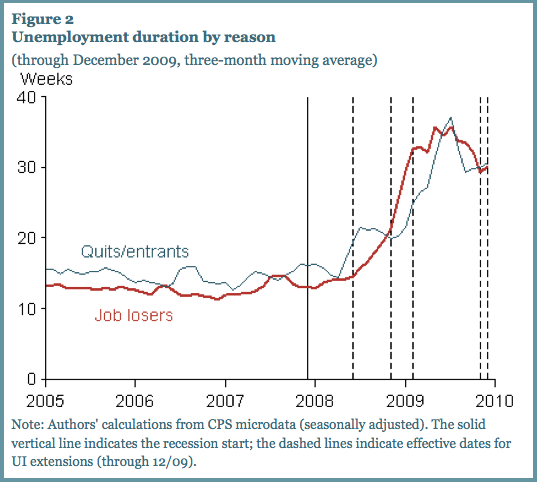Short answer: Yes.
Slightly longer answer: Not very many people, and not much lazier.
Rob Valletta and Katherine Kuang of the Federal Reserve Bank of San Francisco just released a new study of unemployment insurance and unemployment. This graphic stands out:
People who quit their jobs or are just entering the job market aren’t eligible for unemployment compensation. People who lose their jobs are. This is just the kind of great natural experiment that lets us judge, by comparison, the effects of past policies.
The money quote:
The differential increase of 1.6 weeks for job losers is the presumed impact of extended UI benefits on unemployment duration. It is straightforward to translate this increase in unemployment duration into an effect on the unemployment rate, based on their proportional relationship and adjusted for the share of job losers in overall unemployment, which was about 67% in December 2009. The implied increase in the unemployment rate is quite small, slightly less than 0.4 percentage point, indicating that without UI extensions, the measured unemployment rate would have been 9.6% in December 2009 rather than the observed 10.0%.
Job losers (eligible for UIC) take an extra week and a half to get jobs.
So the “obvious” is true: if you pay people not to work, they will work less, in aggregate. Some people will opt for “funemployment” insurance and take the summer off. But that simplistic truism hides the truly important reality: the effect is very small — even when you throw five UI extensions into the mix.
Simplistic arithmetic based on this study suggests that any given moment, because of UIC there are about 600,000 people not working, who would be working without it. (.004 times the U.S. work force of 150 million.) That sounds like a lot, and it’s certainly enough to inflame many people’s hot-wired “cheater resentment” genes.
But the reality is, there will always be gamers, cheaters, and free-riders, in any system. (Just look east, to Wall Street.) In the case of unemployment I say get over it. They’re a tiny percentage, and in the big picture the effects are trivial.
Maybe my resentment genes are pathologically inoperative, but these numbers do a hell of a lot more to light up my compassion genes — compassion for the 14.4 million hard workers who are protected from potential economic catastrophe, a catastropohe that was none of their own doing. (I won’t even start on how the whole economy is better off as a result.)
If 600,000 people get a few weeks of extra leisure along the way — the kind of extended leisure time that I, lucky soul, have been blessed with throughout my life — I say more power to ’em.

Comments
5 responses to “Does Unemployment Insurance Make People Lazy?”
There is an alternative explanation for the extra time people take to find a job vs those who quit or are just entering. There is a decent probability that people lost their job because it became obsolete. If that obsolescence applied across the industry, then they likely do not have the skills necessary to find an existing job quickly.
@Chris
Or, if not obsolete, it’s a mass layoff because of slow demand in some area of the economy. Which means that they and many other similarly situated folks have to wait for hiring in their industry to resume.
@Chris
You may be right. But I think it would be silly to suggest that nobody is encouraged by UIC to stay unemployed. I have some friends who have taken funemployment breaks. But interestingly, they never seem to stick with it very long. They always get jobs before it runs out. (That, of course, is because they can.)
[…] Reserve Bank of San Francisco do a lot to answer that question. Returning here to an earlier post, on Valletta and Kuang’s study of unemployment insurance and unemployment. This graphic […]
[…] Basic economic theory predicts that unemployment insurance will make people lazier. The real question is: how much lazier? You can start here. […]